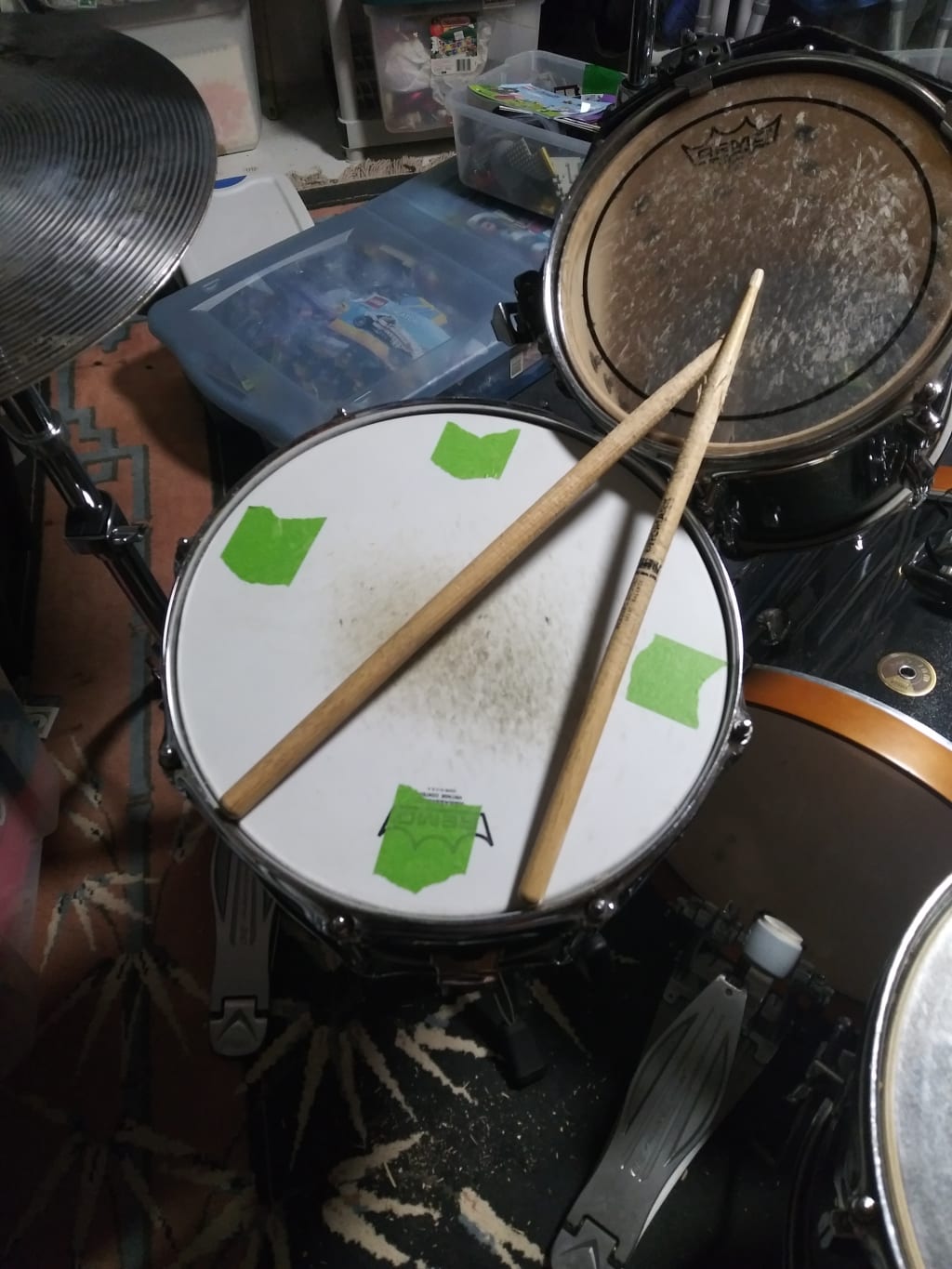
For better or worse, I have been a drummer for almost twenty years. Through the phases of my life, drumming has been a hobby, an amateur career, an old passion needing to be rediscovered and during my most formative years, a way of life. In junior high and high school years, the other “serious,” drummers and I worshiped at the altar of Bonham, Peart, Moon and Baker. The drummers who were in the popular clique idolized Travis Barker, Andy Hurley and Blake Richardson. Regardless of what particular teenage culture you found yourself in, if you couldn’t talk about your favorite solo by Buddy Rich or Gene Krupa, you weren’t a real drummer. We judged each other on what Zeppelin and Rush songs we could play all the way through. The single kick players trash-talked the double kick players.We compared each other's set ups and stick choices.The drummers in my small suburban town took their craft very seriously, and we judged harshly. Far from being immune to the culture of ridicule and elitism, I had some of the most intense opinions of my day. I swore by Vic Firth and thought Pro Mark was “trendy and too breakable.” I called Mapex a fake brand (Ironically, I now sit on a Mapex throne when I play. It has held up for over five years and was very reasonably priced). I laughed behind the backs of rock drummers who didn’t incorporate rudiments into their fills. I will readily admit that I was the textbook pretentious musician. Then, one day the unthinkable happened: I fell in love with Punk Rock, and began writing my own songs. Of course, this didn’t sit well with my fellow musicians who saw this genre as a joke, a style one defaulted to when they couldn’t play their instrument. Because of this disdain, I couldn’t find any punk bands to play drums for, and I committed yet another atrocity: I learned a few chords on the guitar and set out to start and front my own band. This left me with a task that would go on to change my attitude toward my main instrument forever: finding a drummer that was good enough for my band.
Eventually, after being laughed at and denied by all my old drummer friends, I had a friend from band class come audition. This friend claimed to be a drummer, but he wasn’t a part of our circle and I had never heard him play a full drum kit. As we warmed up, I listened to his playing and decided before we even started that he was terrible. His beats were basic, his fills often ran over the meter and threw off the timing, even just looking at his hands I could see his horribly flawed technique. Despite my quick judgement, since he was a friend I decided to go through with the audition and show him the songs I was writing. I launched into a heartfelt teenage pop-punk song I had put the finishing touches on just before auditioning band members. I already had a beat in my head and I hoped it would be common sense for such a simple song. To my dismay, he played quarters on the high-hats, the snare on two and four, and the kick drum on one and the and of three in contrast with a guitar pattern reminiscent of dookie-era Green Day. I was about to stop the song and go show him the beat myself when something clicked in my stuck-up brain. What we were doing was exhilarating. It was raw, powerful and fast. It didn’t sound like the bands from the 90s I was trying to emulate, it sounded new and different. We spent the next few hours working out every part of the song together. Aside from a few fills and a vocals only bridge, my friend kept plugging away at his basic beat while I flailed on my guitar. Needless to say, he got the gig and I learned a lesson so valuable that I feel the need to write it down fifteen years later: There is no such thing as a bad drummer. There are drummers with poor technique, drummers with a warped sense of timing, drummers who can’t solo, drummers who can’t keep a consistent tempo, drummers who can’t tune, drummers who have never even heard of a rudiment. The amazing thing I have found over the years is that you can learn something new from each and every drummer you encounter that will improve your own playing. I have painstakingly narrowed down five lessons I have learned from “bad,” drummers that, in my no longer pretentious opinion, have made me a more well rounded player.
1. Creative Fills
If a drummer suffers from poor technique and lacks any formal training, it can be difficult to roll down all of the toms at the end of a phrase or throw in some rudimental flares as a song changes from verse to chorus. Sometimes, this results in a complete lack of fills and a drummer who seems to be hanging on to the beat for dear life. With more spirited novice players, however, you can hear a fill that you never would have imagined trying yourself. When a musician develops their style with no guidance or study of the greats who came before them, they may miss out on a great deal of skill and education, but the wonderful trade off is that every fill, every drum part to any song their band plays, comes only from their imagination. When I think of unique fills that a seasoned professional may turn up their nose at, my mind often drifts back to the Lookout! Records roster of the late 80s and early 90s. The music from those bands was revolutionary, and the drummers were notoriously sloppy, many of them only picking up the instrument to play in a punk band. The first time I heard Dave Mello play a measure of straight quarter notes from his snare down all his toms into the last chorus of Operation Ivy’s “Take Warning,” I was just as blown away as the first time I heard John Bonham pound out the outro to Led Zeppelin’s “Rock and Roll.” Isocracy’s album “Bedtime for Isocracy,” has some of the strangest, most off tempo and least sophisticated drumming I have ever heard, and yet John Kiffmeyer (who also went on to play in Green Day as they cut their teeth in the early DIY scene,) quickly became one of my favorite drummers, largely due to the fact that I had never heard anyone play like him. In fact, I stole the quick snare/hi-hat drum transition from Green Day’s “The Judge’s Daughter,” for a drum part in one of my early punk bands! Although it is inspiring and amazing to watch an expert drummer effortlessly shred the kit in ways that make my brain hurt, when convention is cast aside, the way is paved for innovation.
2. Musical Playing
Many drummers only start playing drums to join a band. They may have a favorite band whose drummer they try to emulate, or know a few beats from the rock band video games, but there is a special quality to these types of drummers. While an experienced drummer may have a mental grab bag of beats and grooves to choose from (a shuffle here, four on the floor there, triplet feel for the bridge), a drummer who only started in a band can only base their beats off what that band is playing. They will lock on to the guitar, bass or vocals and emulate that rhythm. This makes for a very musical style of playing that can add layers of feeling or emotion to music. The drumming isn’t about how fast they can play, how many fills they can fit or how smooth the beat is. It is about how the percussion serves the song, how it moves the music forward or holds it in place. Many people lament the “terrible,” musicianship of White Stripes drummer Meg White. My challenge to this group of haters is to imagine any of your favorite drummers playing “Seven Nation Army,’ or “Doorbell.” It just doesn’t fit. A drummer like Meg White only comes a few times in a generation of music. She is amazing because of what she doesn’t do. She plays the bare minimum amount of notes required for the song, and because of that, the song breathes and expands. The space between the notes is it’s own music. For me, if I can view a song’s drum part as its own composition, I’m immediately hooked.
3. Making it Fit
Now this one can be really interesting and extremely annoying, sometimes all at once. I have, multiple times, seen drummers who seem to know only one beat, and use it for every single song. While this can be repetitive and boring, making you want to take a set-time length smoke break, there is an impressive and educational element. If a band plays ten different songs, all with the same exact drum beat, it does take a certain level of brain power and natural rhythm to make that exact beat fit in ten different ways. Phil Rudd of AC/DC fame practically made an entire career out of one beat! In your journey to better yourself as a drummer, it is important to realize that with the right sense of timing anything can fit anywhere. Once you internalize this lesson, you’ll find yourself adding unexpected triplets in straight 4/4 songs, dragging fills across the end of one measure into the beginning of a new one (looking at you, Travis Barker), and creating fresh and new patterns for a song you previously would have used an old-reliable for.
4. Underground Music!
Some drummers throughout rock history have been famously kicked out of their bands and replaced by “better,” players. While this can be tragic and ruin the lives and careers of hard working musicians, some great lesser known bands have come from drummers who have been belittled and written off by their old bands and teenagers arguing on “ who was better,” forums. Scott Raynor (ex blink-182) has a wealth of under the radar projects from the past twenty odd years, most recently a Goth-Punk band called The Wraith. Listening to their “Shadow Flag,” EP, I certainly didn’t hear someone living in the shadow of the legendary Travis Barker, I heard a confident and hard hitting drummer ferociously driving heavy, gloom-ridden songs. If you listen to the few albums worth of fifth Beatle Pete Best’s post fab four work, you hear a drummer passionately slamming out classic rock n roll over the course of over five decades and sounding just as excited each time. As a musician, especially a gigging one, it is important to know that there will always be another project, and oftentimes the one that you thought was the project is not where your journey is supposed to end. If everything went according to plan in the music world, Tommy Ramone himself never would have become a drummer (an interesting story for another article)!
5. Spirit, Spirit, Spirit!
Most drummers love their craft, respect their craft and take their craft very seriously. That is why sometimes we will see some goofy looking drummer flailing around and smashing every cymbal onstage and feel annoyed. This is a sacred art! There are techniques to be followed! Technique is important for your improvement as a drummer and in many cases for your physical health, but we can definitely learn something from that Keith Moon wannabe up on stage. As with any passion or craft, we were originally drawn to it because it was cool, it was fun and it resonated with us down to our very soul. I remember playing along to my favorite songs in my basement growing up and feeling accomplished and proud when I learned every note that my heroes played. I remember spending hours trying different tunings and set ups. Those were some of the highlights of my young life! Before anyone saw me play, before the bands, before ever touring or lugging the kit around in my car. Just playing. Getting to know my instrument. When we see this wacky person onstage who will probably have carpal tunnel before their 25th birthday, we can assume this lesson stuck and never went away. I know I can speak for a lot of gigging drummers (and any gigging musician) when I say that you can get lost in self doubt and criticism. It can become a job, a responsibility. Sometimes, you have to force yourself to be that goofy kid who wailed on the used Pearl Export your parents bought you, (come on, we all had one) smiling the whole time.
This is the lesson I will leave you with: there are no bad drummers, you can learn from and connect with any musician you meet and you will be better for it, musically and likely personally. If you love what you do, all you need is a little dedication and an open mind and you will achieve something you can be proud of. Now, put away your practice pads and turn off the lesson videos for a day and let your imagination fly!
About the Creator
DJ Mosher
Ex-punk, aspiring freelance writer.
Commission me here! https://www.fiverr.com/users/djmosher/seller_dashboard






Comments
There are no comments for this story
Be the first to respond and start the conversation.